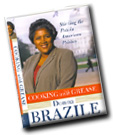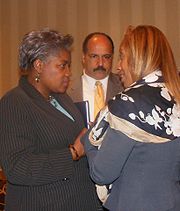
Donna Brazile

Brazile takes charge

Brazile’s Memoirs

Brazile at work
Legends
By Yussuf J. Simmonds
Assistant Managing Editor
DONNA BRAZILE
“The first African American woman to become campaign manager of a major presidential campaign.”
As the unsung hero of the 2000 Democratic campaign, Donna Brazile was the campaign manager of the presidential campaign that was eventually decided by the U.S. Supreme Court rather than the popular vote. Though her candidate received a majority of the popular vote, he was denied the presidency. During the recounts in Florida and the court cases in the Florida and U.S. Supreme Courts, Brazile receded from the spotlight and it focused on the “Bush v Gore” fiasco which ended one of the most highly contested presidential cases in the nation’s history and shook the country’s ideals of true democracy. Despite her hard work and tremendous sacrifice that made Brazile’s candidate capture the majority vote, five of the nine justices in the U.S. Supreme Court–and the Electoral College–saw it differently.
In 2004, Brazile wrote “Cooking with Grease,” a memoir of her life and times that laid out some of the behind-the-scenes trappings of the 2000 campaign and the other campaigns with which she was involved. Her story is a powerful account of political tenacity and the rise of a Black woman from Kenner, Louisiana–where she was born–to the halls of power, in Washington, D. C. and beyond. The story of Brazile’s rise in the rough-and-tumble world of national politics is the story of every Black woman; she sub-titled the cover of her book, “Stirring the Pots in American Politics.”
The third of nine children born to Lionel and Jean Brazile, she graduated from Louisiana State University and got her political baptism the hard way. During her formative years on the university campus, Brazile lobbied for student financial aid; she organized demonstrations to make Dr. Martin Luther King Jr.’s birthday a national holiday; and worked for several advocacy groups along the way.
Though she is mostly associated with the 2000 presidential campaign, Brazile has worked on many presidential campaigns–all Democrats–including Carter/Mondale in 1976 and 1980; Jesse Jackson in the 1984 primary; Mondale/Ferraro in 1984; Richard Gephardt in the 1988 primary; and Dukakis/Bentsen in 1988. Her political activism coupled with her commitment to social equality resulted in a dynamic personality that made her one of the most outspoken and forceful political activists on the scene today. In the midst of the 2008 presidential campaign, as a guest on the television show, “The Colbert Report,” Brazile was asked which of the candidates she would be supporting notwithstanding, she was a super-delegate in the Democratic party. Referring to the three candidates, she said “I’m a woman, so I like Hilary (Clinton); I’m Black, I like (Barack) Obama; but I’m also grumpy, so I like John McCain.”
The title she chose for her book gave an inkling into her being–her New Orleans roots. Each of the 17 chapters is introduced by a kind of Cajun food and in addition, Brazile named the chapters mainly after New Orleans dishes including Jambalaya, Crawfish Etouffee, Crabmeat Lafitte and Oysters Bienville. When she graduated from Grace King, an all-girls public high school (now co-ed) serving Jefferson Parish, Brazile stated that she knew politics was going to be her career. She remembered that President Carter was in the White House and there were many Blacks in his administration including his cabinet. That apparently inspired her and triggered her political aspirations.
At that time, one of her major personal decisions was the choice of colleges/universities to attend. Her eyes were on Howard University, Washington, D.C., one of the pre-eminent, historically Black universities in the country. She had already been to Louisiana State University (LSU)–where she ran for local positions–but somehow Washington seemed to beckon her. Meanwhile Brazile’s cousins were working tirelessly to elect the first African American mayor of New Orleans , Ernest Morial, who became one of her new role models.
The combination of Mardi Gras and partying had a sobering effect on Brazile and in essence, helped to determine her success later on as a political strategist, and a good one, at that.
Prior to leaving for LSU, she realized how the impact of the local culture–parties, funerals, movies and other joyous festivities–were prominent in folks’ lives, and civic participation (besides voting), on a serious level, was absent, even though talking politics was as natural as seafood gumbo. Brazile wanted to be a registered Democratic, not only in words, but in deeds.
Those ideal blended well during her stay at LSU; Brazile noted the progress Blacks had made from being locked out of the political system to now seeing mayors, state representatives all across the country. Of course, things were not always peaches-and-cream; sometimes, there were bumps in the road, but overall more Blacks were being elevated in government jobs and more Blacks were going to college. By the end of her second year, due to financial considerations, Brazile’s focus changed from political science to psychology, but she remained wedded to politics and to attending Howard University.
Just before she left LSU, Brazile voted in her first presidential election–the Carter/Reagan–and by the time she left, President Reagan was in the White House, and a conservative mood had enveloped the country. In 1981, she attended a Youth Peace and Disarmament Conference in Helsinki, Finland, and learned firsthand how negatively other peoples viewed nuclear arms. That was one of the factors that hardened her resolve to want to go to Washington to work towards change. Brazile became actively involved in the United States Student Association (USSA), lined up a job as a lobbyist with the National Student Education Fund and moved to Washington, D.C.
Less than four years later, she was working in the primary campaign of Rev. Jesse Jackson’s first historic bid for the presidency. He had called her personally to solicit her help in kicking off his campaign. Her name was getting around. Later on, in 1984, Brazile redirected her energies towards the campaign of the Democratic nominee, Walter Mondale. After the nominating convention was over, Brazile was the first person from the Jackson camp that the Mondale camp wanted to hire. She was cementing her credentials as a serious player in the arena of national politics.
In the next presidential campaign, certain changes were apparent on the political landscape. The last Jackson campaign was successful in registering millions of new voters and that resulted in an influx of Black elected officials, but Brazile concentrated on moving beyond African American voters. So after meeting with Rev. Jackson and laying out her position, she went with Richard Gephardt for the 1988 primary. As deputy campaign manager, Brazile realistically thought of it as the glass ceiling–her omega in politics. After all, there had never been a Black or White woman who had managed a presidential campaign up to that point.
After the nominating convention, it was like dŽjˆ vu. Brazile’s candidate lost the primary and she went to work for the party’s nominee, Michael Dukakis. This time there was an inspirational difference: the campaign manager of the Dukakis presidential campaign was a woman, Susan Estrich, the first woman to be the campaign manager of a presidential campaign. (Later on, Brazile followed her footsteps). However, after Brazile made some off-the-cuff remarks that raised questions about the Republican candidate’s extramarital affairs and racial insensitivity in general, to the press, she was asked to resign. The campaign disavowed her remarks and she resigned/was fired for the good of the campaign. But the campaign lost the election big time.
Though politically wounded, Brazile was still endowed with solid credentials and her skills and expertise were still in demand. She became an advisor for Bill Clinton’s presidential campaigns that won the White House for the Democrats in 1992 and 1996 respectively. Brazile also served as chief of staff and press secretary for Eleanor Holmes Norton, the congressional delegate for the District of Columbia. There she guided legislation and the district’s budget in the Congress.
The problems Brazile experienced during the Dukakis campaign soured her a bit about campaigns so much so that she decided to look for a regular job. However, the hiatus allowed her to visit her family in Kenner more often while doing intermittent consulting work, working on local campaigns, and on causes for the homeless and AIDS victims. In 1998, Brazile was appointed an at-large member of the Democratic National Committee. Then in 1999, her career path took a historic turn, Brazile was appointed deputy campaign manager and later campaign manager of the 2000 presidential campaign, making her the first African American woman to be so appointed.
Brazile was back, front and center, in national politics and this time in the top spot managing the campaign of Vice President Al Gore in his bid to become president. She ran the campaign masterfully with precision and grace. She was able to handle reporters who tried to rehash her dark experiences of the 1988 campaign with minor trepidation after recalling the counseling that she had received from Rev. Jackson about responding to someone else’s questioning. Brazile guided the campaign through the delicate maze of debates, a nominating convention and a 50-state election day voting. But on the night of November 4, 2000, no clear winner was decided and the fate of the election went into overtime. A major discrepancy arose in Florida and neither candidate would concede. There were numerous calls for recounts and after weeks of wrangling, it reached the U.S. Supreme Court which decided in favor of George W. Bush becoming the 43rd president of the United States. Through Brazile’s efforts as campaign manager, her candidate had amassed the majority of the popular votes.
After the 2000 election, Brazile continued helping campaigns, traveling from state to state in furtherance of electing Democratic Party candidates. She was appointed Chair of the Democratic National Committee’s Voting Rights Institute which was established to promote and protect the rights of all Americans to participate in the political process. In addition to her work as a campaign advisor, she has contributed to CNN’s Inside Politics, Late Edition and American Morning. A columnist for “Roll Call,” Brazile has taught at the University of Maryland, Harvard’s Institute of Politics and Georgetown University. She is the founder and managing director of Brazile & Associates, a political consulting grassroots advocacy firm in the nation’s capital that teaches the secrets of successful political campaigning covering campaign management, message development, media and communication tactics, and internet and new technologies.
In the 2008 campaign, Brazile helped to resolve the controversy caused by the early primaries in Florida and Michigan. At the Rules Committee meeting of the Democratic Party, she stated, “We need to send a message that you can’t defy the rules.”
Brazile has received numerous awards including the Congressional Black Caucus Foundation’s Award for Political Achievement, Essence Magazine’s 50 Most Powerful Women in Washington D.C. and Washingtonian Magazine’s 100 Most Powerful Women in Washington, D.C. She has garnered the respect of colleagues and adversaries alike and is comfortable engaging them in political discourse.
Currently, she has injected herself into the national healthcare debate stating: “One of the greatest worries congressional staffers face when organizing a town hall meeting for their boss is that no one will attend it. Now they really have something to fear: organizing gangs of partisan hecklers intent on stopping a national dialogue on health reform.”






